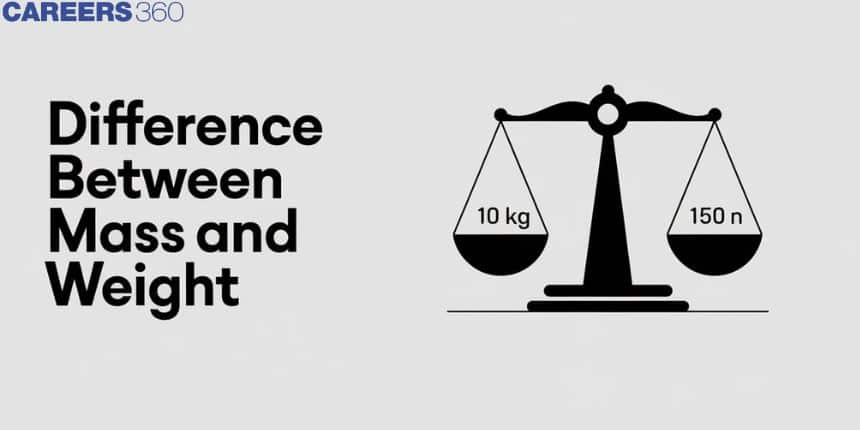Difference Between Mass and Weight
We habitually use the words mass and weight without knowing their difference. So, what is the difference between mass and weight? The terms 'mass' and 'weight' have different meanings and concepts in physics. It is important to understand the difference between these two terms. Mass is intrinsic property while weight is extrinsic property. This article discusses what is mass and weight, their units, dimensional formulas, and mass and weight differences.
JEE Main/NEET 2027: Physics Important Formulas for Class 10
NEET 2025: Mock Test Series | Syllabus | High Scoring Topics | PYQs
JEE Main: Study Materials | High Scoring Topics | Preparation Guide
JEE Main: Syllabus | Sample Papers | Mock Tests | PYQs
- Mass
- Weight
- Equation Relating Mass and Weight
- What is the Difference Between Mass and Weight
- Mass Vs Weight

Mass
A body's mass is an intrinsic attribute that measures its inertia. It measures how much resistance a body puts up when trying to change its state of motion. Mass and energy, according to Einstein's theory of relativity, are the same thing. Newton's second law is used to define mass mathematically. The amount of matter present in a thing is expressed by its mass. There can't be zero mass in a physical body.
SI Unit Of Mass
The SI unit of mass is
1 milligram is
1 microgram is
Dimensional Formula Of Mass
The dimensional formula of mass is
Weight
The weight of a body is the amount of force exerted by a gravitational field (such as the Earth's gravity).
Weight
Because a body's weight is determined by the effect of the gravitational field acting on it, a body of the same mass might have various weights in different areas. Even a huge object's weight can be zero.
SI unit Of Weight
The SI unit of weight is Newton(
Other units are dyne and kilogram-force.
1 dyne
Dimensional Formula Of Weight
The dimensional formula for weight is
Equation Relating Mass and Weight
Weight
OR
where,
- Weight is the force exerted on the object by the gravity
- Mass is the mass of an object
- "g" is the acceleration due to gravity
Also read -
- NCERT Solutions for Class 11 Physics
- NCERT Solutions for Class 12 Physics
- NCERT Solutions for All Subjects
What is the Difference Between Mass and Weight
Although mass and weight are commonly used interchangeably in everyday situations, they refer to different quantities in physics. Mass and weight, on the other hand, are inextricably linked. Here we are going to distinguish between mass and weight. The amount of matter present in a thing is expressed by its mass. There can't be zero mass in a physical body. The gravitational field of another huge object exerts a force on any massive body. This force is referred to as weight. The mass of a thing determines its weight. When the gravitational field strength changes, a body's weight changes, but its mass remains constant. For example, an object's mass is the same on Earth and Mars, but its weight is different. So far, we have discussed two differences between mass and weight.
This image shows us different bodies with the same weight taken at places with different gravitational forces.

| Related Topics, |
Mass Vs Weight
Mass and Weight Differences are as follows:
| Property | Mass | Weight |
| Definition | When a force is applied to an item, its mass is defined by the amount of acceleration it experiences. | In a gravitational field, any object with mass experiences a gravitational force. The object's weight is the gravitational force. |
| Type of quantity | Mass is a fundamental or base quantity | Weight is a derived quantity. |
| Dimension | [M] | [MLT-2] weight has the dimension of force. |
| Type of Physical quantity | Mass is a scalar quantity. Since it only has magnitude and no direction. | Since force is a vector quantity, weight is also a vector quantity. |
| Units | SI unit: kilogram (kg) CGS unit: gram (g) FPS unit: pound (lb) | SI unit: Represented by (N) CGS unit: g.cms Represented by (Dyn) FPS unit: Represented by (pdl) |
| Effect of gravity | Gravity does not affect mass because it is an intrinsic characteristic. If a physical body does not release or absorb energy in any form, its mass remains constant. | Because weight is related to gravitational acceleration, it fluctuates with the gravitational field. |
| Zero gravity condition | When a body is not in a gravitational field, its mass is not zero. | In a gravitational field with zero gravity, weight is zero. A body's weight is virtually zero, for example, during an ideal free fall or in space. |
| During the presence of other forces | According to the definition of mass, it does not depend on any force. So, it does not change in the presence of forces. | Weight changes in the presence of different kinds of forces. For example:Buoyant force acts on a body immersed in a fluid. This force changes the weight of the immersed body. Inside an accelerating lift, a person's weight can shift. If the acceleration is upwards, it becomes heavier, and if the acceleration is downwards, it becomes lighter. A body effectively becomes weightless during a free fall (downward acceleration equal to gravitational acceleration). |
| Instruments of measurement | Various balancing procedures can be used to determine mass. Weight can also be used to determine it. The mass of subatomic charged particles with very tiny masses is measured with the help of electric field and magnetic field. | A spring balance is commonly used to determine weight. |
The above table has distinguished mass and weight thoroughly.
The Difference Between Mass And Weight With Examples
Inside a fluid, an object's weight may appear to increase or decrease, but its mass remains constant. Everything would be a little heavier in the absence of the Earth's atmosphere (but we wouldn't be alive to check that).

Because the gravitational accelerations of different planets are not equal, objects weigh differently on different planets. (for example, an astronomer weighs less on the Moon than on the Earth).
The weight of an astronomer in space is zero.

Frequently Asked Questions (FAQs)
Mass is an intrinsic quantity, and weight is an extrinsic quantity.
Weight = Force = mg
Yes
Not everything with mass has a charge, but a charge needs to have a mass.
The charge has two types, while mass has only one.
A Charged body have electrostatic force, while a body with mass has gravitational force.
Charges experience two nature of electrostatic force (repulsive and attractive) while gravitational force is only attractive.
SI unit for weight is kgms-2 or Newton(N). Other units are gcms-2 or dyne, lbfts-2 or poundal
SI unit for mass is the kilogram (kg). Other units are gram(g), milligram(mg)
Weight = Force = mg
Substitute 5 kg for 'm', 20 ms-2 for 'g'.
w=5×20
w=100 N
Also Read
21 May'25 12:19 PM
05 Feb'25 04:38 PM
11 Jan'25 03:12 PM
03 Dec'24 04:00 AM
03 Dec'24 03:48 AM
29 Nov'24 11:10 AM
28 Nov'24 01:12 AM
27 Nov'24 11:57 PM
27 Nov'24 02:41 PM
27 Nov'24 02:15 PM

